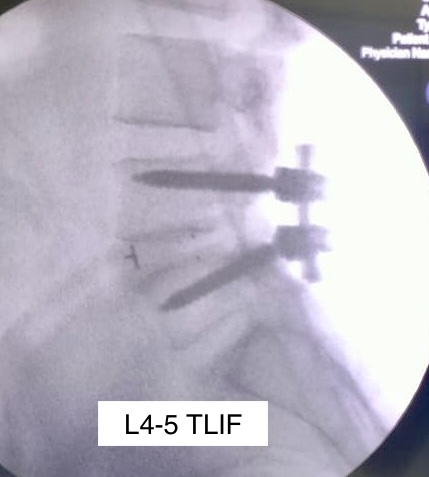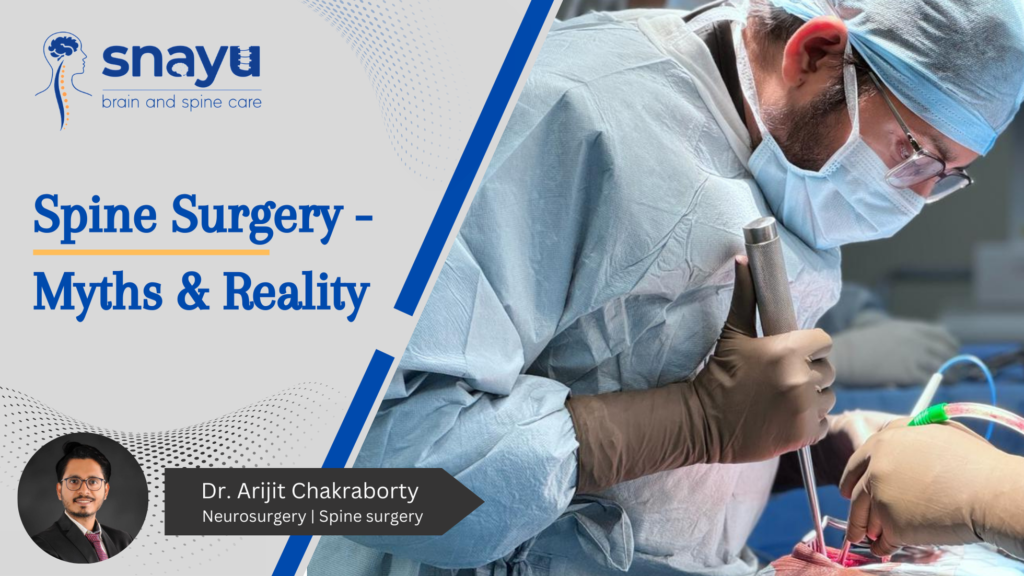“Spinal surgery is not the beginning of the end, but rather the start of a new life free from debilitating pain.” – Dr. Paul C. McAfee.
Spine surgery is often surrounded by myths and misconceptions that can cause unnecessary fear and anxiety. Many people believe that spine surgery is dangerous, has a low success rate, or leads to lifelong complications. However, advancements in medical technology and surgical techniques have significantly improved the safety and effectiveness of spine surgeries. This blog aims to dispel common myths, present the reality, and highlight the importance of spine surgery in addressing a significant global health burden.
Myth 1: Spine Surgery is Extremely Risky and Unsafe One of the most pervasive myths is that spine surgery is highly risky, with a low chance of success. However, reality tells a different story. Modern spine surgery is remarkably safe, with success rates often exceeding 90% for many procedures. In India, as well as globally, thousands of spine surgeries are performed each year with excellent outcomes. According to recent data, the complication rate for spine surgery is very low, especially when performed by experienced surgeons.
Myth 2: Spine Surgery Leads to Paralysis Another common fear is that undergoing spine surgery might result in paralysis (especially Cervical Spine Surgeries). While any surgery carries some level of risk, the chances of paralysis from spine surgery are exceedingly rare. Reality shows that advancements in surgical techniques, including the use of high-tech tools like neuronavigation, intraoperative monitoring, and microsurgery, have made spine surgeries much safer. The key to minimizing risk is choosing an experienced surgeon who specializes in complex spine procedures.
Myth 3: Spine Surgery Should Be the Last Resort Many people believe that spine surgery should only be considered when all other treatments have failed. Reality is that while conservative treatments like physical therapy, medications, and injections are often effective, surgery can be the best option for certain conditions. Conditions like herniated discs, spinal stenosis, and degenerative spine diseases can sometimes only be effectively treated through surgery. Delaying surgery can sometimes lead to worsening symptoms and more complex surgical procedures.
To know more about the evolution of the Spine surgery Click here
The Global and Indian Disease Burden Spinal disorders are a significant health burden both globally and in India. According to the Global Burden of Disease Study, low back pain is the leading cause of disability worldwide. In India, it’s estimated that around 20% of the population will experience back pain at some point in their lives, with a significant number requiring surgical intervention. Spine surgery plays a crucial role in helping patients regain their mobility and quality of life.
Safety and Efficacy of Spine Surgery The safety of spine surgery has improved dramatically in recent years. Infections, one of the primary concerns for any surgery, are extremely rare in spine procedures, with rates often below 1%. Advances in surgical techniques, such as minimally invasive surgery (MIS), have further reduced recovery times and improved outcomes. These advancements mean that most patients can return to their daily activities much sooner than in the past.
Table: Success Rates, Descriptions, and Complication Rates of Common Spine Surgeries
| Surgery type | Success rate | Brief description | Complication rate |
| TLIF (fusion) | 85-95% | A procedure to stabilize the spine and relieve pain by fusing two or more vertebrae. | 3-5% |
| Discectomy | 90-95% | Removal of herniated disc material to alleviate nerve compression and relieve pain. | <2% |
| Kyphoplasty | 85-90% | Minimally invasive procedure to stabilize fractures in the vertebrae, typically due to osteoporosis. | <1% |
Low Complication Rates: The complication rates for these procedures are generally low, highlighting their safety and effectiveness when performed by experienced surgeons.

“Spine surgery, when performed with precision and care, offers a real chance for patients to regain their lives, free from pain and limitations.”
As a neurosurgeon with extensive experience in complex spine surgeries, I have successfully treated numerous patients with varying spine conditions. My approach combines the latest surgical techniques with a deep understanding of spinal anatomy to achieve the best possible outcomes. Whether it’s a simple discectomy or a complex spinal fusion, I prioritize patient safety, comfort, and recovery.
Take-Home Message Spine surgery is a safe and effective option for many patients suffering from spinal disorders. Dispelling the myths and understanding the reality can help patients make informed decisions about their treatment. With the right expertise and modern surgical techniques, spine surgery can significantly improve the quality of life for many individuals.



Dr Arijit is a great doctor undoubtedly, on the 1st of Nov, 2024 he did spine surgery of my mom, she is 63 years old, but touch wood the way he did it’s remarkable, I really would have not expected the surgery went this well, such a perfectionist doctor he is, not only a good doctor but an excellent human being, extremely well behaved and connect with the patient’s attendees so easily as my own brother, felt so relaxed and trusted. The way he guided throughout the journey of this critical procedure we never felt to have a second openion ever. My heartfelt thanks to save my mom’s life and ours too. Hope you achieve all the milestones of success and fame soon which you deserve. All the very best bro..
Thank you very much for your kind words & blessings. I am very happy to help.
It’s a very informative blog
Thank you, I am glad to know that.